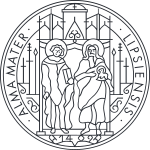
Back جامعة لايبتزغ Arabic جامعة لايبتزج ARZ Universidá de Leipzig AST Leypsiq Universiteti Azerbaijani لایپزیق بیلیمیوردو AZB Лейпцыгскі ўніверсітэт Byelorussian Лайпцигски университет Bulgarian Universitat de Leipzig Catalan Università di Lipsia Corsican Lipská univerzita Czech
Universität Leipzig | |
 Seal of Leipzig University | |
| Latin: Universitas Lipsiensis | |
| Motto | Aus Tradition Grenzen überschreiten (German) |
|---|---|
Motto in English | Crossing boundaries out of tradition |
| Type | Public research university |
| Established | 2 December 1409 |
| Budget | € 408.9 million[1] |
| Rector | Eva Inés Obergfell |
Academic staff | 3,234[1] |
Administrative staff | 1,962[1] |
| Students | 29,459[2] |
| Location | , , Germany 51°20′20″N 12°22′43″E / 51.33889°N 12.37861°E |
| Campus | Urban |
| Colours | Red Light Blue |
| Affiliations | Utrecht Network German U15 |
| Website | uni-leipzig.de |
 | |
Leipzig University (German: Universität Leipzig), in Leipzig in Saxony, Germany, is one of the world's oldest universities and the second-oldest university (by consecutive years of existence) in Germany. The university was founded on 2 December 1409 by Frederick I, Elector of Saxony and his brother William II, Margrave of Meissen, and originally comprised the four scholastic faculties. Since its inception, the university has engaged in teaching and research for over 600 years without interruption.
Famous alumni include Angela Merkel, Gottfried Wilhelm von Leibniz, Johann Wolfgang von Goethe, Leopold von Ranke, Friedrich Nietzsche, Robert Schumann, Richard Wagner, Tycho Brahe, Georgius Agricola. The university is associated with ten Nobel laureates, most recently with Svante Pääbo who won the Nobel Prize for Medicine in 2022.
- ^ a b c "Jahresbericht 2015" (PDF). Leipzig University (in German). pp. 53–59. Retrieved 18 June 2017.
- ^ "Zahlen und Fakten". Leipzig University (in German). Archived from the original on 5 June 2018. Retrieved 18 June 2017.
© MMXXIII Rich X Search. We shall prevail. All rights reserved. Rich X Search